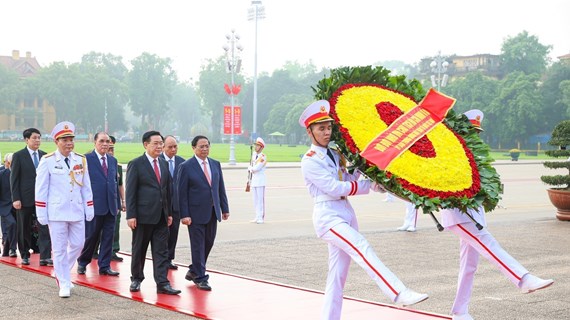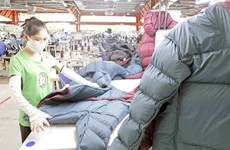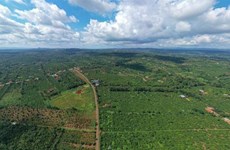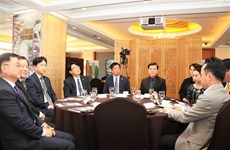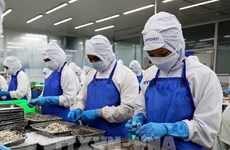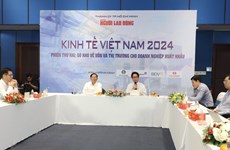Ambassador affirms Japanese investors’ interest in Mekong Delta
Many Japanese investors are keen on investing in the Mekong Delta, Japanese Ambassador to Vietnam Umeda Kunio affirmed at a conference in Can Tho city on April 18.
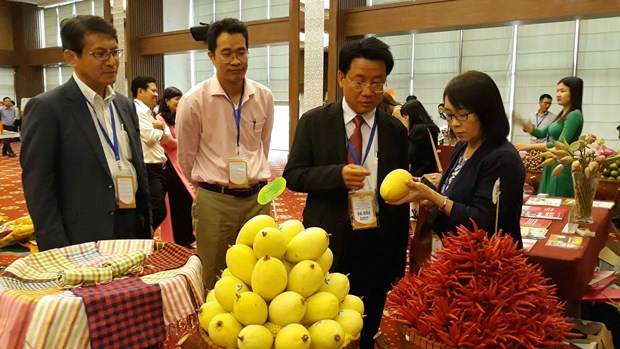 Participants in the conference examines Mekong Delta products on the sidelines of the event (Photo: VNA)
Participants in the conference examines Mekong Delta products on the sidelines of the event (Photo: VNA)Can Tho (VNA) – Many Japanese investors are keen on investing in the Mekong Delta, Japanese Ambassador to Vietnam Umeda Kunio affirmed at a conference in Can Tho city on April 18.
The conference, aiming to connect Japanese partners with the 12 provinces and Can Tho city of the Mekong Delta, drew more than 160 Japanese businesses, more than 50 of which came to Vietnam for the first time.
Cooperation potential in transport infrastructure development was among the main issues attracting participants’ attention.
Luu Quang Khanh, Director of the Ministry of Planning and Investment’s Department for Foreign Economic Relations, said the Mekong Delta has a favourable intra-regional transport system helping connect many localities within the region and support development. This system also links the Mekong Delta, located in the southwest of Vietnam, with the southeastern region, especially Ho Chi Minh City, and other regions in Vietnam and neighbouring countries.
He noted despite those advantages, the Mekong Delta hasn’t attracted much investment from Japan due to asynchronous infrastructure linking the whole region with other regions and linking production areas with consumption markets.
Konaka Tetsuo, Chief Representative of the Japan International Cooperation Agency in Vietnam, said to help southwestern localities solve transport problems, research organisations of Japan are ready to transfer bridge and road models using Japan’s high-quality materials and advanced technologies to the Mekong Delta.
Japan will also help local authorities seek capable investors to partner in developing arterial transport projects like My Thuan – Can Tho Expressway, Trung Luong – Can Tho Expressway and the National Road 30 expansion, he added.
Regarding tourism cooperation, Takahashi Ayumi, Chief Representative of the Japan National Tourism Organisation (JNTO) in Vietnam, said the number of Vietnamese tourists to Japan and vice versa has grown strongly over the last 10 years, about 30 percent year on year.
[Meeting looks to increase Japanese presence in Mekong Delta]
However, Japanese arrivals in the Mekong Delta remain modest, partly because tourism promotion activities of the localities have yet to truly access tourists. Most Japanese tourists just visit big cities like Hanoi, Ho Chi Minh City and Da Nang.
He said to address this problem, the JNTO will work with local administrations to hold cultural exchanges with arts programmes and exhibitions of the Mekong Delta’s traditional products to introduce local culture to the Japanese. It will also connect the local tourism sector with the Japan Association of Travel Agents to share information about tourists’ taste.
On agricultural ties, Takimoto Koji, Chief Representative of the Japan External Trade Organisation in HCM City, pointed out that although the Mekong Delta boasts many advantages of agricultural and aquatic products, cheap land prices and low labour costs, it lacks effective connectivity among localities.
He said the region lacks suitable development strategies to optimise production chains, boost product quality and productivity, and diversify products to meet demand.
Appreciating Koji’s opinions, Director of the Department for International Cooperation of the Ministry of Agriculture and Rural Development Tran Kim Long said Vietnam is working to turn the Mekong Delta’s agriculture into a smart and sustainable one.
The country hopes for assistance from Japanese partners in applying new technologies, especially bio-technology, in aquaculture, rice cultivation and fruit farming to enhance product quality and value. Vietnam also wants help to adapt agriculture to climate change, the official noted.
Asazuma Shinichi, envoy of the Japanese Embassy in Vietnam, said many agricultural businesses of Japan are seeking cooperation with Vietnamese firms, including those in the Mekong Delta.
Leaders of the region need to understand investors’ demand and improve the local investment climate. The Japanese Embassy will support the organisation of annual conferences to introduce the Mekong Delta’s investment environment to foreign investors.-VNA





